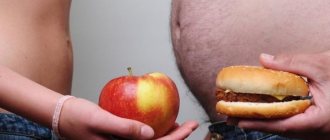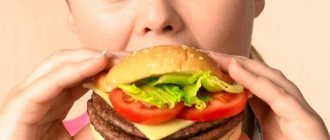Many people, trying to avoid excess weight without any weight loss diets, have good control over their daily diet. But at night their appetite grows rapidly, causing a strong feeling of hunger and forcing them to make an overnight “pilgrimage” to the refrigerator. This is how nighttime overeating develops.
Night eating syndrome (NBS) is a condition in which nighttime overeating is combined with sleep problems. People suffering from SSP consume an increased amount of food in the afternoon, sleep poorly, and when they wake up, they go to the refrigerator.
Symptoms of nighttime eating
A person with night eating syndrome eats at least a quarter of the daily amount of calories after lunch, which provokes negative physical sensations and emotional experiences, and anxiety.
If you notice this behavior in yourself and wake up to eat at least twice a week, you may be developing night eating syndrome. At the same time, you must also experience at least three of the following symptoms:
- Lack of appetite in the morning;
- Strong desire to eat between lunch and bedtime;
- Insomnia four or five nights a week;
- The belief that food is necessary to fall asleep at all or to fall asleep after waking up;
- Depressed mood that worsens in the evening hours;
Nighttime binge eating disorder is different from binge eating disorder. So with compulsive overeating, a person eats a lot in one sitting. At the same time, with night overeating syndrome, the main meal occurs in the afternoon or at night.
Five ways to lull your nighttime appetite
Several categories of people are drawn to the refrigerator at night
Photo: Oleg RUKAVITSIN
— At night, several categories of people are drawn to the refrigerator: those who are actively pursuing their figure (they are either on a diet, or simply strictly limit the quantity and quality of food); those who, without dieting, are simply undernourished during the day - due to lack of time or personal disorganization; and those who have loneliness or personal problems make them want to simply “eat them up,” explains our expert, member of the National Association of Dietetics and Nutritionists, nutritionist Lyudmila Denisenko . - Of course, there is another category of people - with problems of the gastrointestinal tract (for example, with stomach ulcers, which are characterized by “hunger” pains). But we are talking about relatively healthy people. Just hungry. Strictly speaking, the problem of nighttime eating occurs due to a drop in blood sugar levels. And here I, as a doctor, can say: if you want to eat, eat! But not just anyhow. For example, a bowl of salad (without vegetable mayonnaise) is much healthier than a piece of sausage on white bread. The worst thing is that when hunger pangs strike, we eat so quickly that our blood sugar levels do not have time to rise. This requires at least 10 minutes. And 20 minutes for the signal to reach the brain - the stomach is full, everything is fine! We are full and ready to finally fall asleep.
But there are also several useful ideas on how to overcome your nighttime appetite. Well, or at least make sure that the next morning you don’t suffer from remorse from the series “I ate too much yesterday again, I need to limit my food today.” This will only worsen the problem, because in the evening the terrible night glutton will come again and torment you. So, a step-by-step strategy for combating night hunger:
1. Next, don’t forget about water for a second! Remember, we often confuse hunger and thirst. In case of an acute attack of hunger, train yourself to first drink a glass of still water at room temperature. Often this successfully replaces a meal.
2. Didn't it work out? Try drinking a glass of kefir or warm milk with spices (turmeric, cinnamon, ground ginger on the tip of a knife) and a teaspoon of honey. But it’s better to forget about juice, tea, coffee, often they only stimulate the appetite.
3. If this doesn’t seem enough, make yourself some toast with ham or meat (cheese and cottage cheese are also suitable) and leave the kitchen. There is a high probability that you will no longer want to go back.
4. If the sandwich didn’t help, and you’re back at the refrigerator, accept it. Take a large plate and put a piece (spoon) of everything you have in the refrigerator. Variety perfectly compensates for the small amount of food, so that the wolves will be full and their waistlines will be intact.
5. And the last thing (following smoothly from the above): do not keep “harmful” foods in the refrigerator or on the table! If you can find kefir and cake in your house, most likely at night you will be drawn to the cake.
IMPORTANT!
And most importantly, you just have to force yourself to eat three to four times a day. And understand that there are no “forbidden” foods, and you can afford ANY tasty treat, but it’s better during the day. And a small piece.
BY THE WAY
No bad news, just a warm bath!
What also helps is the lack of stress before bed. There is no need to surf news sites, watch TV or read sad books. In the evening - bath, aroma massage, warm socks, fussing with the cat, romantic comedy and early sleep. At the same time, in the bathroom, critically examine your sides, you will definitely find a couple of extra centimeters. Here is another incentive to avoid the refrigerator. If your main activity (including food) is in the evenings, then you should think about evening workouts. Choose low-intensity training and practices aimed at stabilizing your emotional and physical state (tai chi, yoga). Exercise will help you get rid of daytime stress, clear your mind of obsessive thoughts and improve the quality of your sleep. At the same time, moderate physical activity helps suppress acute hunger. Go to bed on time. If vital matters do not distract you from sleep, try to go to bed not too late and at the same time.
What causes increased appetite at night?
At the moment, the cause of nighttime overeating has not been established. Doctors believe that such overeating may be associated with sleep-wake cycle disorders and hormonal imbalances. However, changes in the sleep-wake schedule will not bring a positive effect.
A person is more likely to have night eating disorder if they are obese or have another eating disorder. Depression, anxiety and other anxiety spectrum disorders, and substance abuse are more common in people with SUD.
Symptoms of night eating syndrome occur in just over 1 in 100 people. With obesity, the statistics change and the likelihood that a person suffers from nighttime overeating is 1 in 10.
Useful recommendations from experts
To forget about bouts of rabid appetite during sleep and at night, you should first of all strictly adhere to the recommendations of nutritionists in this regard.
- Don't gobble up food right after you get home from work. This postulate must be observed by you, even if you are forced to work every day for 8-12 hours a day without a proper snack, not to mention a full lunch. Experts advise first to undress and take a bath or shower, then rest a little, preferably in a lying position - literally 15-20 minutes - and only then start preparing a delicious dinner. You shouldn’t limit yourself to a sandwich with sausage and a cup of tea - such a meal will certainly make you feel hungry at night, since this food will be digested very quickly. Dinner should consist of foods that can give you a long-lasting feeling of fullness.
- The last meal should be taken 2-3 hours before going to bed. This way you are guaranteed to reduce the risk of an attack of night hunger. If you want, you can stick to the “dinner before 19.00 pm” rule. But in this case, you will have to go to bed no later than 22.00, otherwise, when it’s time to go to the kingdom of Morpheus, your stomach will begin to demand its toll - keep this in mind!
- In general, the earlier you go to bed, the less likely you are to feel hungry at night. The fact is that you will sleep more soundly, and therefore your brain most likely will not respond to the needs of the digestive organ.
- If you wake up in the middle of the night with a desire to refresh yourself, you shouldn’t get hung up on thoughts about all kinds of delicacies in your refrigerator. First, try to think about something completely different: for example, about the upcoming holiday this weekend, that soon you will finally go on a long-awaited trip, etc. This way you can deceive your body and dull the acute feeling of hunger at night.
- However, if turning your thoughts in a different direction does not help, it is better to get up and head straight to the kitchen. True, not to pounce on food, but to exercise and train your own willpower. This is done as follows: go to the refrigerator, inhale and rest your hands on it, then step back, slightly bend your knees, now exhale, arch your back and hold in this position for 10 seconds. The muscles must be tensed as much as possible. Breathe evenly, measuredly and deeply. Repeat this exercise up to three times. At the end, lower your arms down and relax your body. The reward for your efforts will be the complete disappearance of the desire to kill the worm, which drove you out of bed in the middle of the night.

- Make sure your night's sleep is sound and healthy. An hour before going to bed, ventilate your bedroom and take a short walk in the fresh air. When you return home, brew yourself a herbal tea from medicinal plants with a sedative effect, such as motherwort, St. John's wort, hop cones, and lemon balm. You can add 1 tsp to the drink. honey - it also helps you fall asleep quickly.
- When you go to bed, place a sachet of dried lavender or thyme next to you or at the head of your head. The aroma emitted by herbs will help you fall asleep easily and not wake up until the morning.
How is night eating syndrome diagnosed?
Nocturnal binge eating syndrome can be diagnosed after taking a history of sleep, eating habits, etc., possibly in the form of a detailed questionnaire. You may also be asked to take a sleep pattern test called polysomnography. It measures your:
- Brain waves
- Blood oxygen level
- Heart rate and breathing rate
Polysomnography is usually performed in a hospital or specialized sleep center.
A diagnosis of NES can be made if a person has been binge eating at night for at least 3 months. Eating and sleeping patterns also must not be caused by a substance abuse disorder, medical disorder, medication, or other mental health problem.
I wake up at night from hunger - why and what to do?
“For the past few nights I’ve been waking up at night from hunger, and I’m so hungry that, as in the joke, I go to the refrigerator and start stuffing everything I see into myself. What happened with me? Isn't this a disease?
A strong feeling of hunger at night most often results from a disruption in the production of hormones. It does not always happen due to illness, but in order not to wake up from hunger and sleep soundly until the morning, you need to understand the reasons for what is happening.
First of all, you should think about your daily nutrition. Skipping dinner and insufficient calories prompt the body to demand supplements when other things have ceased to distract attention to themselves.
It is necessary to analyze whether the daily routine has changed in recent weeks. If there are more frequent cases when you have to stay late in the office or at home, or experience nervous tension, this may be the reason. The body, under the influence of harmful factors, switches to a different mode of life, starting to produce the sleep hormone later than usual or even in the morning.

In this case, to regain a restful sleep and not wake up at night, you will need:
- eat small portions every 3-4 hours during the day, following the rule: a light dinner is taken 3 hours before going to bed;
- drink enough fluid, but do not drink coffee in the evenings, which excites the nervous system;
- gradually go to bed earlier and earlier in order to restore your routine, because sleep that begins before 24.00 is the most sound;
- Consider a calming ritual if you have difficulty falling asleep, for example, take a walk before bed, take a relaxing bath, drink a mug of warm milk or herbal tea;
- Contact a specialist if you cannot cope with severe nervous tension on your own.
The occurrence of hunger attacks at night while following the correct regime is a reason to consult a doctor. This may be a sign of developing gastritis. Inflammation of the gastric mucosa causes increased production of acids necessary for digestion. It seems to a person that he has a strong feeling of hunger, especially after a snack it becomes easier.
If the doctor really detects gastritis, he will prescribe the necessary medications and a special diet. Complex therapy will gradually eliminate the discomfort in the stomach that prevents you from getting enough sleep.
In addition, pregnant women often complain of nocturnal appetite due to hormonal changes in the body.
When you wake up feeling hungry, you shouldn’t try to fall back to sleep - it’s unlikely to happen quickly, and you’ll end up with a lack of sleep. It is better to go to the kitchen and drink half a mug of water in small sips. If the emptiness remains inside, you need to have a snack with low-calorie protein foods (cottage cheese, low-fat yogurt, kefir with bran).
An interesting question: how to lose weight if you work at night?
To a reader's question
answered nutritionist Kristina Petrovna Nikolaeva.
Want to ask your question? — Do it on THIS PAGE!
- 16
( 1 ratings, average: 4.00 out of 5)
Treatment for nighttime eating
To treat nighttime binge eating, antidepressants and non-drug psychotherapy are used, which may include techniques aimed at mindfulness, relaxation and other methods, depending on the cause of nighttime binge eating. Often, a specific treatment plan is drawn up by a psychotherapist after collecting an anamnesis at the first consultation. At the same time, in no case should you self-medicate or self-prescribe drugs, especially when it comes to a person’s mental health and psychological well-being.
Night hunger
“For the last couple of months, I have been tormented by hunger at night. I go to bed and can’t sleep. And sometimes I even get up in the middle of the night to get something to eat. So it won’t take long to gain weight. Tell me how to deal with this?” Marina K., Moscow
Svetlana Sergeevna Vinogradova, a privately practicing nutritionist and therapist from Moscow, answers.
Restore mode
First of all, you need to understand what causes nighttime hunger attacks. There aren't many reasons. The main one is a violation of the diet and the day in general. Modern women encounter it quite often. There's a deadline at work and we spend the night preparing a report. Or we sit for 12 hours in the office under electric lighting. Because of this, the boundaries of the day are blurred. And the body is rebuilt, and at the endocrine level.
Our body produces two important hormones - melatonin and leptin. The first is activated in the evening and is responsible for the quality of sleep. The second enters the bloodstream during daylight hours and causes a desire to eat. But if you go to bed late, the exact opposite happens. You feel low in energy all day and can’t bring yourself to eat a spoonful of soup. And at night you suddenly become cheerful and empty the refrigerator.
Dealing with this is not difficult. The main thing is to retrain yourself to go to bed at least at midnight. To make the task easier, at first you can drink soothing tea or a glass of warm milk before bed. It promotes the production of the “sleepy” hormone.
It is very important to monitor your diet. During the day it should be fractional. When we eat little and often, we feel evenly full, without pangs of hunger. Be sure to have dinner around 8 pm.
If you are just about to leave work at this time, have dinner at the office. Get used to carrying around a container with a piece of chicken or fish, a small amount of side dish and a large amount of salad. Thanks to this, closer to night you will be full and fall asleep quickly.
If you do wake up in the middle of the night with a feeling of emptiness in your stomach, do not torture yourself. It is extremely difficult to fall asleep in this state. To relieve hunger, start by drinking half a glass of water. And then, if necessary, eat something not too high in calories. For example, a glass of plain yogurt or some cottage cheese. If it's just a problem with jet lag, this will help you fall asleep.
Get checked for gastritis. Night hunger may have other causes. If you have not changed your regimen and do not have the habit of sitting late, it makes sense to go to a gastroenterologist. Often, a nighttime craving for the refrigerator is a sign of gastritis. The stomach throws out too much digestive juice, causing discomfort. We take it for hunger and go to the kitchen. After eating, the discomfort goes away. But, unfortunately, this does not solve the main problem. On the contrary, we only overload the stomach, forcing it to work at inopportune times. And thereby we contribute to even greater development of gastritis. In such cases, a doctor should prescribe a special diet. But even before visiting a specialist, it makes sense to start eating at a strictly defined time. And also exclude spicy, fatty and fried foods from your diet.
Rule out depression
Doctors paid attention to the third group of causes of night hunger only a few years ago. But now it is clear that it is very common, especially among residents of megacities. We are talking about psychological problems - from simple stress to hidden depression.
In this case, night hunger has the same background as, for example, constant gluttony. With the help of food, a person tries to unconsciously improve his mood. Therefore, in the middle of the night, he doesn’t indulge in everything, but only in the most delicious things - cakes, cookies, chocolate.
To cope with such attacks, you need to get rid of what torments you. Night hunger is often caused by a feeling of dissatisfaction. For example, salary, or position in a team, or family relationships. During the day, we control our actions and behave as people around us expect. But at night, control weakens, we feel that we are missing something in life. And the easiest way to fill the inner psychological emptiness is, oddly enough, to eat.
In such a situation, it makes sense to conduct a thorough self-analysis or consult a psychologist.
Moreover, it is advisable not to go to a general specialist, but to an expert in eating behavior. Such psychotherapists talk to clients not only about food, but also about life in general. Plus, they can recommend how to restrain yourself if you suddenly have a desire to eat cakes in the middle of the night. Evgeniy MIKHAILOV










